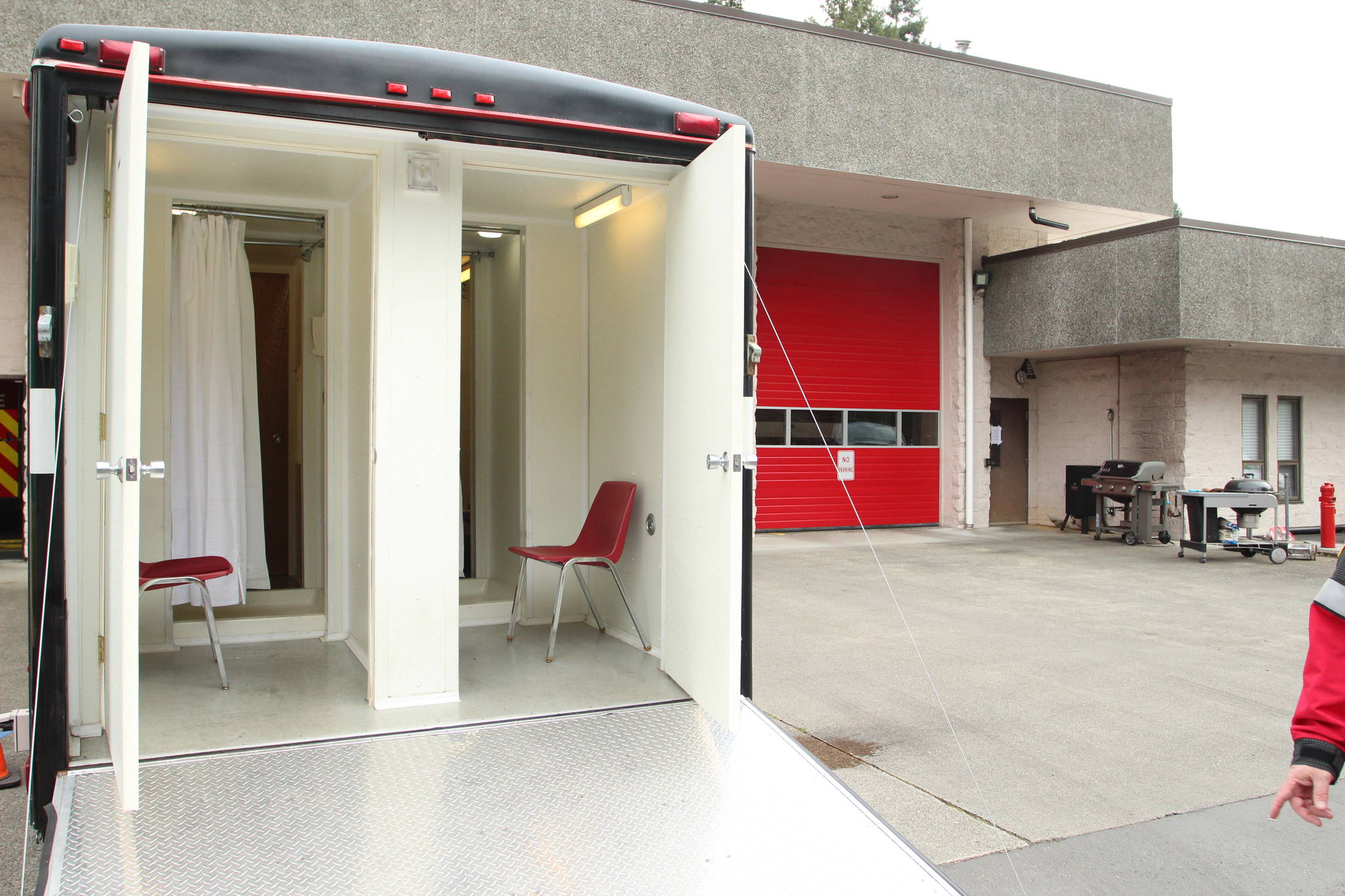As the COVID-19 outbreak continues to sweep the King County area and beyond, South King Fire and Rescue members have developed a decontamination resource for their brothers and sisters in blue.
Police officers don’t just arrest people — they are also first responders who conduct CPR or other life-saving interventions on emergency scenes, said Lt. Greg Willett, South King Fire’s Hazardous Materials Technical Safety Officer.
“There was a problem recognized throughout our three law enforcement agencies that we respond with, that there was no plan for deconing,” said Willett regarding an officer’s risk of contamination or exposure to the virus.
The Law Enforcement Decontamination (LED) service is housed at SKFR Station 61, 3203 S. 360th St. in Auburn, with the purpose of reducing exposure, reducing uncertainty and keeping essential equipment and personnel in service.
Willett, along with Assistant Chief Dave Mataftin and Captain Shane Smith, created a plan from scratch to provide thorough decontamination resources by using their own special operations teams for officers who come in contact with bodily fluids of a potential COVID-19 patient.
“This is unique because really, there was a lot of anxiety from police — they don’t have as much PPE (personal protective equipment) as we have,” Willett said. “If they do get contaminated, it’s a bigger deal for them.”
Officers who believe they have come in contact with the virus while on duty now have the option of utilizing SKFR’s Hazmat trailer to take a private shower while a member of the HazMat team disinfects the officer’s weapons, body armor, uniform, or vehicle as needed.
Before their shower, officers are provided a prepackaged pre-decon kit, with a biobag for remaining contaminated clothing, a personal effects bag, a marker pen for identification, a small nail brush and soap. A post-decon kit includes disposable towels, hospital-type gown, slippers and anti-microbial wipes.
There are two separate and private shower areas if multiple officers need to be decontaminated.
To disinfect, Hazmat members use atomizing sprayers to create a fine mist of disinfectant to cover the greatest surface area of the item. Sprays and disinfectants used by SKFR are approved by the Centers for Disease Control and Prevention, and are known to kill the virus in approximately three minutes, Willett said. The department is taking full precaution by sanitizing items for up to 10 minutes.
Officers who go through the LED process are also medically monitored for South King’s records, although COVID-19 testing is not available at this site.
The site has been offered to law enforcement parents of the Federal Way Police Department, Des Moines Police Department and the King County Sheriff’s Office, although Willett said South King Fire will not turn away any law enforcement officer in need.
Police officers are as equipped to handle a pandemic as firefighters are to mitigating a bank robbery, said Assistant Chief Dave Mataftin at a recent board of commissioners meeting.
“When this idea was developed, it started with a desire to look out for those that needed our help,” Mataftin said. “COVID-19 is an issue that has drawn police into the EMS world not by choice, but rather by circumstance. For me, I simply refuse to allow those in blue to fall through the cracks.”
Along with the LED service, South King also recently provided some protective gear and an impromptu training session to police from local departments to help officers become more comfortable facing the pandemic, said Mataftin, who is chief of SKFR’s special operations teams.
The department’s 12-member team of HazMat technicians initially attend a two-week long academy when joining the special ops team, although it takes about three years to become fully versed in HazMat operations and procedures, Willett said.
Even if the HazMat trailer is seldom used, “it provides a peace of mind for the police,” Willett said.
Since opening on March 23, the LED service has been utilized twice: one request for decontamination of a police car and one request for cleaning a police officer’s uniform.
Mataftin said as word of this resource gets out, the number is expected to increase.
First responders say they are consistently reevaluating procedures not just in terms of response, but for protection of themselves, others and resources, Willett said. A major fear is potentially becoming a vector and taking the virus to high-risk places like nursing homes or to their own families.
At a time like this, the calculated procedures and extra precautions South King Fire is implementing can be life-saving, he added.
“Our focus on infectious disease response with Hazmat started with ebola in 2014,” Willett said. “Our policies and procedures were created then, and have since been expanded … We’ve been preparing for quite a while.”
Talk to us
Please share your story tips by emailing editor@kentreporter.com.
To share your opinion for publication, submit a letter through our website https://www.kentreporter.com/submit-letter/. Include your name, address and daytime phone number. (We’ll only publish your name and hometown.) Please keep letters to 300 words or less.

